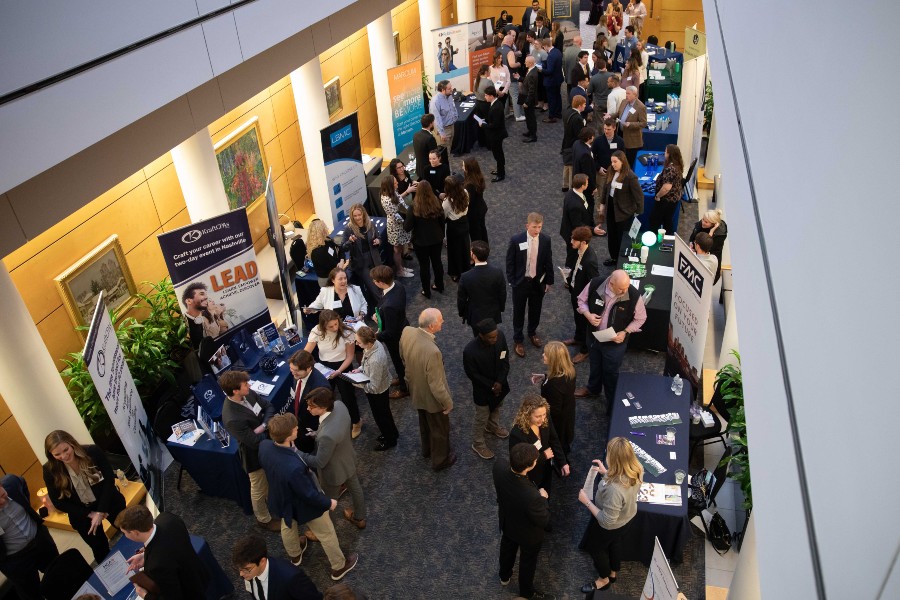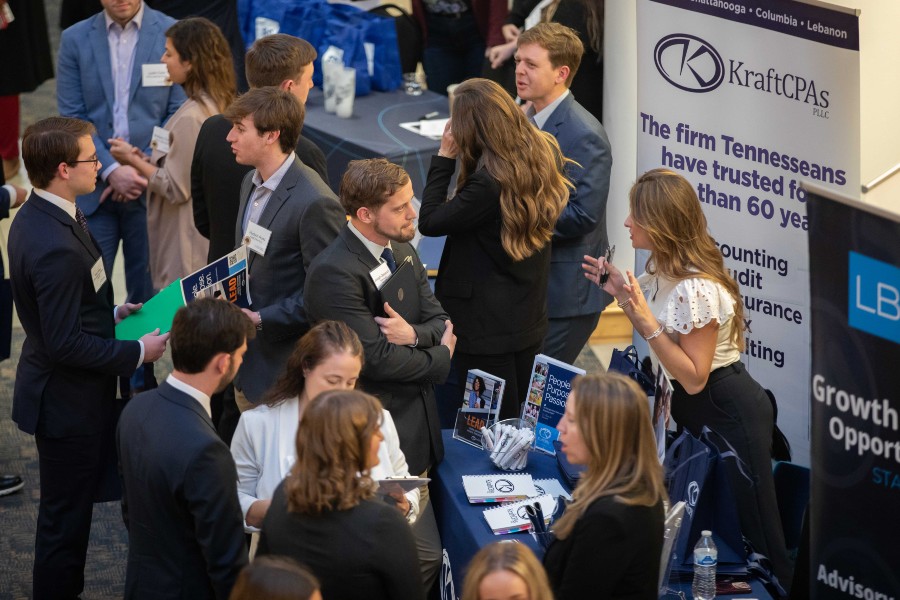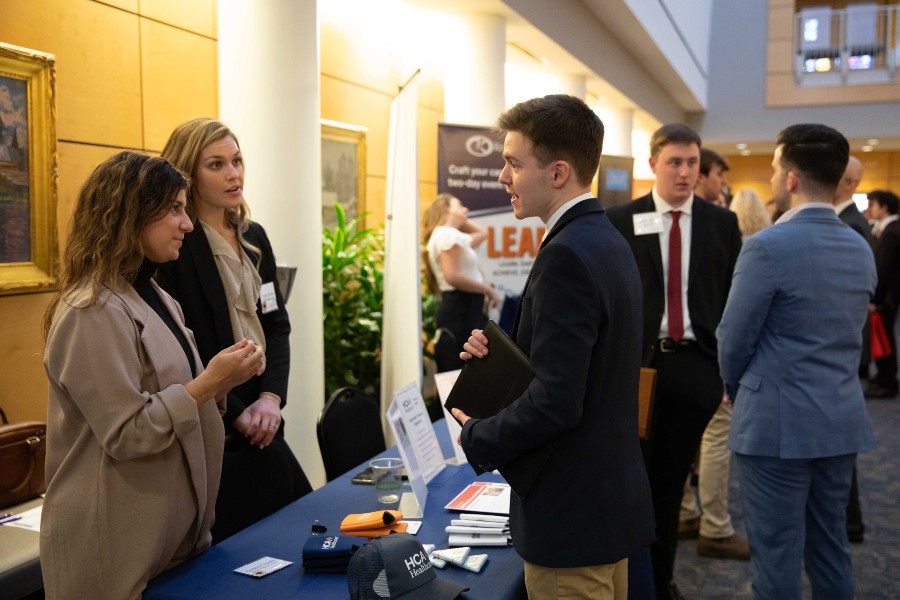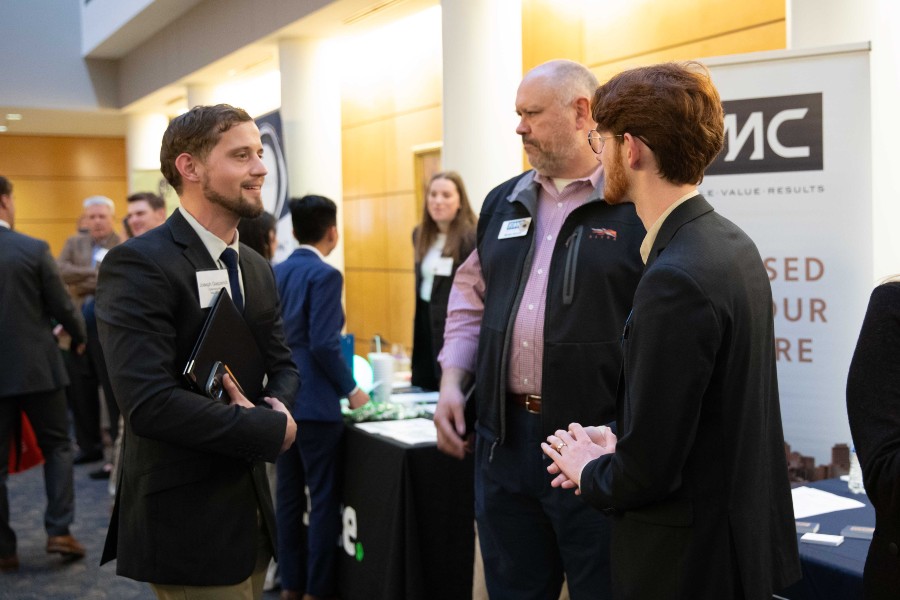Faculty research provides valuable insight into local accounting marketplace
Accounting and finance faculty band together to help local firms address the national staffing shortage in accounting industry.
Janel Shoun-Smith | 615-966-7078 |

Scenes from Lipscomb's annual Meet the Firm career fair focused on accounting majors and employers.
In an effort to address the impact of the nationwide accountant shortage, three Lipscomb accounting and finance professors have banded together to both research and disseminate valuable local information to help the local accounting industry turnaround the staffing shortage.
With a goal to provide regional information that many small firms and sole practitioners may not have access to, the professors have collaborated on six publications and presentations exploring expectations and current standards for competitive salaries, internships and benefits packages.
Susan C. Galbreath, professor, Han-Sheng Chen, associate professor, and Mark Jobe, professor, have published their analyses in Tennessee CPA Journal and the Journal of Business, Industry & Economics, two journals with a large professional audience.
“These small firms don’t have access to as much research to know what benefits packages would be the most useful to them in recruiting,” said Jobe. “This information will help small firms be more competitive and will help students make better job decisions.”
In fact, at networking events over the past two years, local recruiters said they had read the professors’ published articles and found them valuable.

The group has also presented at the regional American Accounting Association and the Society of Business Industry & Economics conferences, and is working on further analyses to continue their goals.
The accounting industry’s staffing challenges over the last few years have been documented by 2019 and 2021 surveys by the American Institute of CPAs (AICPA), and the Covid-19 pandemic followed by the “Great Resignation” created further challenges for the profession, said Galbreath.
With fewer people selecting accounting as a career and retirements creating a shortage of veteran staffers, the industry shortage has rippled out to be reflected in college’s recruiting fewer accounting majors as well, said Galbreath.
“To remain competitive, accounting professionals involved in hiring decisions must be keenly aware of changes in employee expectations and the new post-COVID remote work environment,” the professors wrote in the abstract of their 2023 article published in the Tennessee CPA Journal.
Drawing from their personal experience as accounting professionals in the 1980s, Jobe and Galbreath wondered how accounting salaries were keeping pace in the 2020s, especially in light of the shortage. Using Department of Labor salary statistics, they showed that over the past decade, accounting salaries in Tennessee have lost a lot of ground with almost no increase in comparison to other industries.
In addition, there are more requirements to get into the accounting field today, making it a less attractive option when the salaries do not pay more than other industries without those requirements, noted Jobe.
“Today, there are many other career options for students with similar math and business skills that have fewer obstacles to entry,” he said.

After salaries, the professors’ thoughts then turned to other factors that might be impacted by the demographics of new hires vs. Baby Boomers, and benefits packages stuck out as an area to explore, said Galbreath.
“Firms need to know what today’s graduates are thinking about and valuing in the hiring decision,” she said.
Jobe, Galbreath and Chen partnered with accounting colleagues from other regional institutions in Tennessee to carry out surveys of more than 100 accounting students and more than 480 alumni throughout the region. Chen came on board to provide data analysis of all the survey and statistical data collected for the various research projects.
The survey explored expectations on more than 50 factors such as work environment, retirement plans, paid time off, insurance, perks and salaries.
“It is consistent with both students and alumni that salary is still the most important financial factor, and both groups also expressed dissatisfaction with current salaries in their chosen career,” said Galbreath. “Other factors important to those surveyed were paid time off, insurance, work/life balance and office culture.
“This data shows that firms can make improvements in factors beyond salary to make them more attractive to employees and more competitive in the marketplace,” she said.
Among the most popular new benefits added or expanded by accounting firms in the last few years are parental leave, travel for women’s health services, remote and hybrid work schedules, additional paid time off and insurance benefits. An interesting item was the number of companies that added pet care and insurance benefits.

In 2024, the professors turned their eye toward internships, which are a major tool within the industry to recruit new employees. They surveyed students about how many internships they take while in school, what semesters work best for them, how much they are paid and how the experience impacted their professional commitment.
It is common practice in the industry to make an offer to an intern before they even finish school, effectively taking them ‘off the market’ for other firms, said Galbreath.
But the professors’ data shows that today’s accounting students prefer to engage in multiple internships, so they will be less likely to tie themselves down to a contract after their first internship.
“Our data shows that students who complete multiple internships are actually more likely to stay in the accounting field,” said Galbreath. “If you have multiple bites of the apple, you find the skills and the people you are most comfortable with. You discover your function and find a workplace you like.”
Chen brought into the project a statistical model for measuring professional commitment of employees to their employer. Students with multiple internships showed more professional commitment but they also have higher salary expectations, a factor the group may look at more closely in the future.
With a 100% placement rate for accounting majors, Lipscomb’s College of Business graduates are proof that allowing students to be free to engage in multiple internships, which many Lipscomb students do, is proof that a new approach to hiring interns can be good for the firm, the students and the industry, said Jobe.
While much of the data available for firms to use to address the staffing shortage is national, 85% of the Lipscomb professors’ survey data were from accountants working or studying in the Middle Tennessee region.
“We knew this study would be a benefit to our alums who may want to come back to Nashville to work,” said Jobe. “Big firms always have an information advantage, small firms have to pay for this type of data.”
“We really do feel like this is the tip of the iceberg,” said Galbreath, “a snapshot of where we are now. It is something we plan to do a comparison study of in perhaps the fall of 2025.”